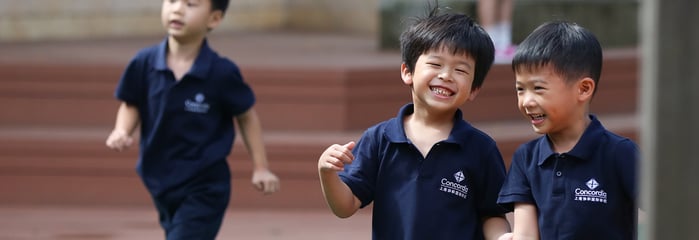When entering a new environment, be it a new country, a new neighborhood, or a new school, we may find it to be an overwhelming and uncertain transition period. Understanding the feelings and emotional consequences that may arise can help strengthen your ability to respond intentionally to your own needs and your child’s needs and interests as you enter and engage in a new school community.
Understanding Culture Shock and the Transition Model
At Concordia Shanghai, we have students from a variety of backgrounds. For some, it may be your first time living in China. For others, you may have lived in China for a long time but are new to Shanghai. Some of our families may be new to the Jinqiao neighborhood. Others may have transferred from another school in Shanghai. In each of these situations, the family will likely experience a period of transition.
Dr. David Pollock’s Person-Centered Transition Model describes the five phases that many families and/or individuals go through in the adjustment process.
- Involvement: Individuals feel a sense of belonging, commitment and intimacy in their old school and community.
- Leaving: Individuals experience a sense of separation as they prepare to leave their old school or community. Some may feel a sense of disengagement or denial.
- Transition: Individuals and families experience a sense of chaos, uncertainty, and anxiety as they transition from their old community to the new community.
- Entering: In the entering phase, individuals may feel a sense of being on the sidelines. They may start to introduce themselves to others within the new community. There may be a feeling of vulnerability.
- Re-engagement: Individuals begin to feel a sense of belonging, commitment to the community, and intimacy with friends and other individuals within the community.
It is important to note that individuals may not go through the above phases in the prescribed order. Often, it is a journey where one may cycle through the various phases. On one day, you may feel a sense of entering, while the next day, you may again feel a sense of chaos and uncertainty. Think about which stage you may be currently experiencing, and which stage your family members may be in. Please be gentle with yourself, with your child, and with your family, and remember that time is your friend.

What This Means for Third Culture Kids
International school children, like our Concordia students, are considered third culture kids (TCK). A third culture kid is “a person who has spent a significant part of his or her developmental years outside the parents’ culture” (David Pollock and Ruth van Reken). This could be a local Chinese child attending an American international school. It might be a Canadian child who was born in China attending an American school. It might be an American child whose parents are completing an expatriate assignment in Shanghai.
Research suggests that during the first three years of adjustment, one might expect to see a higher number of negative emotional and physical responses. However, as the child starts to adapt, you will see a decrease in negative responses and an increase in positive responses.
Short-term negative responses might include feelings of isolation, anxiety, refusal to engage in the community, separation anxiety, and tantrums. Children (and adults) may experience a loss of appetite, upset stomach, sleep disturbances, and poor hygiene. In young children, you may see bed-wetting or a regression of behaviors.
However, long-term responses to cross-cultural experiences suggest many benefits and positive consequences. TCKs tend to pursue higher education degrees, engage in professional careers, speak two or more languages fluently, demonstrate global competence, and exhibit cultural awareness in their interactions and communications. Personality-wise, they tend to be flexible and adaptable, and when faced with challenges, they tend to be the problem-solver and mediator.




